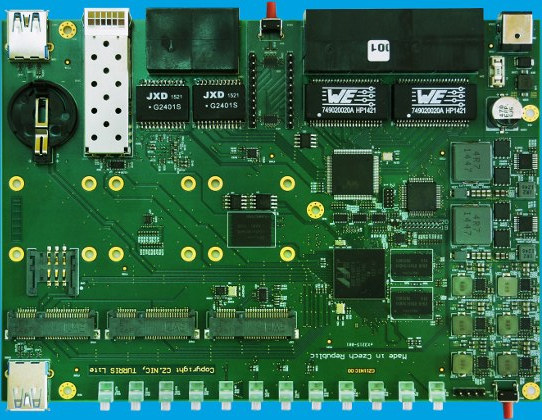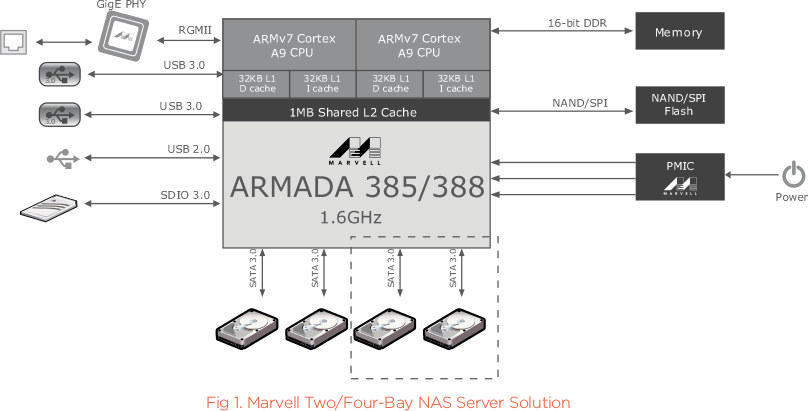FireWRT and WiTi router boards based on Mediatek MT7621A processor offer lots of high speed interfaces with multiple Gigabit Ethernet ports, SATA connectors, and USB 3.0 ports, as well as 802.11ac connectivity for $70 to $80. Sadly FireWRT development was canceled once the company realized they could not get the Mediatek SoC at the right price, and while WiTi router has not been shipped to backers just yet. An even more powerful solution, which should cost $100 and up, is now in development with Turris Omnia board powered by Marvell ARMADA 385 dual core ARMv7 processor, and made in the Czech Republic.

Turris Omnia board specifications:
- Processor – Marvell ARMADA 385 (88F6820?) dual core ARMv7 processor (Cortex A9 class) @ 1.6 GHz with 1MB L2 cache
- System Memory – Up to 1GB DDR3
- Storage – 4GB flash, mSATA slot
- Connectivity
- 5x Gigabit Ethernet LAN ports
- 1x Gigabit Ethernet WAN port
- SFP cage
- Optional 3×3 MIMO 802.11ac, 2×2 MIMO 802.11 b/g/n
- SIM card slot
- USB – 2x USB 3.0 ports
- Expansions
- 2x mini PCI Express slots, 1x optional mSATA / mini PCI Express slot
- Headers for GPIO, I2C, SPI, etc..
- Misc – RTC with battery slot, 12 dimmable RGB LEDs, crypto chip
- Dimensions – N/A

The board will support OpenWRT with automatic updates, and support for virtual servers, e.g. to run Debian or Ubuntu. The SFP connector would allow you to replace your “Fiber To The Home” (FTTH) router, but connecting directly the fiver optic network to the router board. Potential applications include a NAS using the USB 3.0 connectors, a backup Internet connection using the SIM card slot with an mPCIe LTE or 3G modem, a streaming server using a USB DVB tuner card, a security system using a USB webcam to record videos, and so on. The company also claims the board will be open source hardware.
The promo video is a 3D render describing components and ports on the board.
Turris Omnia board will be launched on a crowdfunding platform by the end of 2015. If you are interested, you can sign-up for a non-binding pre-order, and read a few more details on Turris Omnia website.
Via Linux on ARM G+ community.

Jean-Luc started CNX Software in 2010 as a part-time endeavor, before quitting his job as a software engineering manager, and starting to write daily news, and reviews full time later in 2011.
Support CNX Software! Donate via cryptocurrencies, become a Patron on Patreon, or purchase goods on Amazon or Aliexpress






About the company behind this router and why turris omnia has been developed: https://www.youtube.com/watch?v=1Gm_x9vKQ6Q
Will the OpenWRT firmware support the Hardware acceleration for NAT/QoS/crypto that the chipset (likely) has ? (for Atheros/Broadcom-based boards, those features are often only supported with the official BSP from the chipset vendor, and using openwrt often means losing hardware acceleration for those features…)
SFP is a selling point. Is SFP faster than Gigabit Ethernet?
@Fan
SPF can be used for FC at 4.25 Gbit/s, but that’s obviously not applicable for a router. It takes SPF+ to do 10GbE
This what I am talking about for a router! Forget OpenWRT, I would put straight Debian on it… Or maybe OpenBSD if it had support.
Wonder if the WiFi will be Atheros..?
is that a sim card slot? What for?
@flux242
3G or LTE data. One application is to use the board as Internet backup too.
@Kelly
> “I would put straight Debian on it…”
Same question about Debian: will the system support this chipset’s advanced features such as HW acceleration for NAT/QoS/encryption… ?
> “Forget OpenWRT”
Even on more capable machines, OpenWRT can be really nice. For example, the squashfs+overlay makes it very easy to put the filesystem back to factory state (just delete the overlay…).
Looks nice, I’ve signed up for a pre-order. No open source driver for hardware acceleration will be a dealbreaker!
What hardware accelerator do you mean?
It should have a dma/xor engine, it has drivers in upstream linux.
It might have a crypto engine, but it’s not mentioned at Armada 38x and there doesn’t seem to be too much info on the chips aside from what’s on that page and in the linux kernel.
The crypto engine (Marvell CESA) for marvell armada chips is upstreamed aswell, but seems to be flagged as untested right now.
As a ARM Chip manufacturer Marvell’s quite decent, they release information like: Armada 370 Functional Specification, but I can’t find one for 380/385.
@nimeq
perhaps he means NAT network accelerator.
@ade
squashfs+overlay is of course possible with any distribution, actually all GNU/Linux LiveCD/USB (Debian too) using squashfs+overlay(unionfs/aufs/overlayfs), you can customize/create own with your packages what need and your configuration, scripts, etc…
@nimeq
Thanks for the Armada 370 spec. It would be a key selling argument if the all hardware of the device is specified with specs like that. But until then I will not hold my breath.
I mean any HW accelaration that is relevant for a router, like NAT acceleration. I need configurablity of the ethernet switch. As far as I’ve understood broadcom switches need a binary driver, which of course is a pain.
It would be nice if the device could be used as an SDN device, where some packet processing is done in hardware and some in software.
i m actually thinking about using a odroid xu 4(Gb ethernet, usb3, exynos octacore, mali t6**) to have a micro server, but this board is interresting because it has all the connectivity i want.For the price, the processor seems not worth it as a NAS though.
A XU 4 is 74$ and is a way more powerfull . But as a only network solution it’s a nice project.
@Anders
I don’t think Marvell has anything like the NAT accelerator, and I’ve heard it mentioned that even if the Qualcomm-Atheros NAT was open, it wouldn’t be included in the kernel, due to the way it’s integrated and unless you’re doing something crazy, a dual-core 1.6 GHz Cortex-A9 should be fast enough to process quite a few packets.
Marvell DSA switch chips seem (unless they’re somewhere else than the DSA) to be among the only chips supported by upstream kernel and the generic switch code is copyrighted to Marvell. There’s also Broadcom Starfighter 2 support since 2014ish. I’ve never touched the switch stuff so I don’t have any idea on the features / uses.
Also if you really care about open stuff, Marvell stuff has upstream support on a bunch of chips in upstream u-boot, including what seems to be a 88F6820 development board.
And yes, I put a pre-order myself, and fully expect to buy one.
TBH, to me it sounds like what you want is something that costs upwards of 5000$.
@ade
Yeah, maybe if I learned it better. Currently I have way more control if I use Debian
Some news about “Accelerated Data Path (ADP) solution based on ARMADA-385 system-on-chip”.
http://www.marvell.com/company/news/pressDetail.do?releaseID=7316
looks more powerful and more expensive than WITI BOARD
@Kelly
It has MiniPCI-e slots, so you can literally use any Wi-Fi card you want.
Does it have a jtag port?
openSUSE briefly tested on Turris Omnia with mainline Linux: http://lists.opensuse.org/opensuse-arm/2016-03/msg00136.html